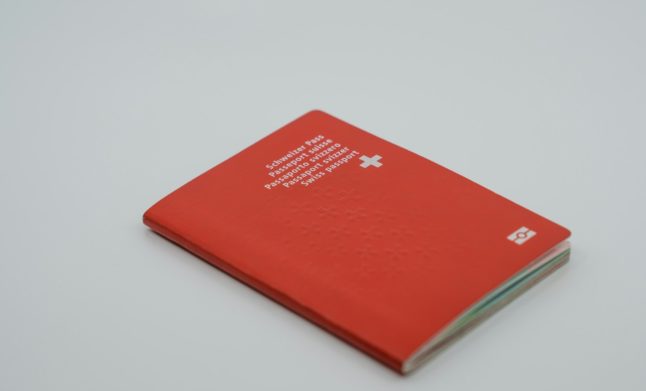There are strict criteria for obtaining Swiss citizenship, ranging from the length of residency and language proficiency, to the level of integration.
Some of the reasons for denying citizenship (even if all other criteria are met) are receiving social assistance or being subject of debt collection proceedings — although a court recently ruled that denying citizenship because of debt is unconstitutional.
These are among the most common reasons why a foreigner may be prevented from seeking naturalisation.
However, from time to time, naturalisation committees across Switzerland deny citizenship to otherwise qualified candidates based on arbitrary and seemingly trivial grounds.
Though they all meet the residency and language requirements, they have failed on the integration criteria, which include compliance with Swiss customs and way of life.
READ ALSO: What does being ‘successfully integrated’ in Switzerland mean?
Mowing the lane
The latest such case involves a Frenchman in canton Jura, whose application was turned down because he was cutting his grass on public holidays.
Clos du Doubs, where the man lives, is a small community of about 1,300 people, so it doesn’t have an actual ‘naturalisation committee’ like larger municipalities do.
Instead, this decision lay with the community assembly.
As Le Quotidien Jurassien reported, during the deliberations in March, “while eleven people gave their consent and six abstained, thirteen members absolutely did not want” the Frenchman to obtain Swiss citizenship.
One of the reasons evoked was the man’s decidedly ‘unSwiss’ behaviour: he routinely disturbed public peace by mowing his lawn and doing yardwork on public holidays.
This may sound drastic, but it is hardly a unique case in Switzerland.
Here are some other examples:
Cow bell complainer
Perhaps one of the most widely publicised cases, both in Switzerland and abroad, involved a Dutch woman, whose citizenship attempt was denied because she complained about the noise of cow bells in her village in Aargau.
Badly dressed
In another weird case that made the news, a family from Kosovo saw their bid for citizenship refused by a Basel-Country community, because they often wore sweatpants in the village and did not greet people in the street.
According to local paper the Basellandschaftliche Zeitung, in 2005 the Halili family received huge support from the village of Bubendorf, in the canton of Basel-Country, when the authorities were considering sending them back to Kosovo .
As a result of that support, they were granted residency in Bubendorf in 2006.
But the family found that support had waned, as their application for citizenship was denied by a resident-led committee in the village.
The family had met the formal requirements for naturalization and had proved that they knew the customs and geography of the region, reported the paper.
some members of the committee judged that the family were not Swiss enough.
Among the complaints against them was the fact that they often wore sweatpants in the village rather than jeans.
Another was that they did not greet people in passing.
READ ALSO: Sweatpant-wearing family denied Swiss passports
Cheesed-off
A British citizen in canton Schwyz was denied a Swiss passport because he didn’t know the origins of Swiss cheese dish raclette — a definite faux-pas in Switzerland.
The 43-year-old British citizen*, attended a citizenship interview at his local town hall in Freienbach in the canton of Schwyz, where he lived since 2011.
The British national had been told in advance that the meeting would be “relaxed talk”. He had already completed the mountain of paperwork necessary for his citizenship application and had passed a demanding written test in early 2017, achieving a score of over 80 percent.
The Brit also grew up in Switzerland. He attended a local school in the French-speaking canton of Vaud, speaks fluent French and German, and understands Swiss German.
“I feel Swiss – very much so. This is my home,” he told The Local.
But the interview proved to be a gruelling experience as he and his six-year-old son were interrogated for an hour by around eight people from the local citizenship committee.
“My son passed with flying colours, but I got some questions about politics wrong and one about where raclette [a cheese dish from the canton of Valais] comes from,” he said.
READ ALSO: Brit denied Swiss citizenship after ‘failing raclette question’
Lack of zoo knowledge
An Italian man was denied Swiss citizenship because he failed the bear necessities – answering questions about local zoo animals.
The man, who lived in Switzerland for more than 30 years and ran an ice cream business, had applied for Swiss citizenship along with his wife and two children.
Initially all applications apart from that of his youngest child were refused in 2015 by the Naturalisation Commission in Arth, in the canton of Schwyz.
Then after an appeal in 2018 an administrative court in Schwyz approved the applications of his eldest son and his wife, but again denied the man’s application.
He was judged to be not socially and culturally integrated enough to be granted citizenship, pointing out his failure to answer a question about bears and wolves at the local zoo, among other things.
READ ALSO: How an Italian man’s lack of zoo animal knowledge cost him Swiss citizenship
The speeder
In yet another example of Swiss authorities denying citizenship to eligible candidates, a French citizen’s application for naturalisation was rejected because he was caught speeding.
The speeding incident dated back to 2017 and the rejection of naturalisation application to 2018, but the final verdict of the applicant’s appeal was published only in January 2023.
The Frenchman, whose identity was not revealed, had lived in Switzerland for 40 years and owns several multi-million-franc businesses here.
In 2017, the Geneva resident reportedly drove past a 40-km/h construction site at 80 km/h and was subsequently slapped with a 540-franc fine.
His citizenship application was initially rejected in 2018, because the naturalisation committee took his careless driving to mean than the candidate was “not successfully integrated.” His appeal against the decision failed.
But that’s not all : these people had their applications cancelled as well:
- An American professor who has lived in Switzerland for 40 years could not name six neighbouring villages, so was denied citizenship.
- An applicant in Aargau forgot the name of the nearest mountain, as well as the local butcher and baker.
- Another candidate called the traditional Alpine horn a ‘Schwizerhorn’ instead of ‘Alphorn’.
READ ALSO: Why your Swiss citizenship application might be rejected – and how to avoid it



 Please whitelist us to continue reading.
Please whitelist us to continue reading.
Member comments